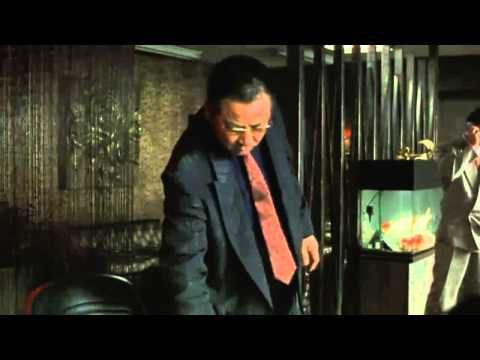
Hi everyone, ive tried finding results and answers for this question but i cannot find it, and i hope that any japanese speaker can help me here.
It seems the language they speak are mostly what ive gathered, spoken only by “Yakuza mafia members” but i dont know if this is true. But the R, the ORRRE and URRRUUU outbursts i dont understand, what do they mean and why do they go so hard? Ill show an example
In this video, ironically called Yakuza Speech, the R is rolling hard, and i read that normal japanese speakers cant even understand it, why?

4 comments
this actor was likely cast for his very juicy delivery. my understanding is he may have been a yakuza at some point in real life. for our purposes this is how a gangster talks in a movie or drama. the only point a non native speaker would have parsing this would be toward some sense or notion of complete comprehension.
90% of TV accents/speech patterns are exaggerated or made up wholecloth. There’s a very long academic reasoning involving the history of Japanese theater, but the short version I’d that Japanese acting and daily speech tend to be different.
Edit: I did want to clarify that I’m not saying Yakuza subculture doesn’t have a distinct way of speaking, just that the on-screen version of it is rarely true to life.
They usually can.
It’s just extremely rough.
-As you pointed out, the rolling RRRs
-Using rough rude 2nd person pronouns such as “temeee” “omae” and “onore” or rarely “kisama”
-very importantly, which gives speech the bad boy edge: the “ai” sound turns to “e”, so for instance wakaranai becomes “wakaranee”
-the rough plural “ra”
– “itsu” (soitsu, aitsu) or “yarou” for people
ex: ano hitotachi (those people) turning into “Aitsura” (those f*ing bastards)
-plain forms everywhere anyway, but add the rude imperative forms.
These are my observations playing Yakuza 0 for instance. A lot of this stuff isn’t unique to the Yakuza, it’s just very rough standard Japanese slang.
(And don’t ask about Osakaben, such as the way Goro Majima talks, as that is a different story altogether)
​
​
This also gives a nice guide for the vocabulary they use: [https://bondlingo.tv/blog/straight-outta-japan-how-to-talk-like-a-yakuza-gangster-in-japanese/?fbclid=IwAR36x-SRZISpuyheeOyKW4m1Fh_5SN1dUsr1oHwLcuv4NutMcR-8ztV3PK0/#Using_Ra_at_the_end_of_your_pronouns](https://bondlingo.tv/blog/straight-outta-japan-how-to-talk-like-a-yakuza-gangster-in-japanese/?fbclid=IwAR36x-SRZISpuyheeOyKW4m1Fh_5SN1dUsr1oHwLcuv4NutMcR-8ztV3PK0/#Using_Ra_at_the_end_of_your_pronouns)
There isn’t really a term for this. It doesn’t correspond to a particular dialect (though both kansai and kantou sometimes try to claim it) nor does it correspond specifically to yakuza.
Rather, these are sort of a generic “ultra rude, ultra male” cliche that you see in a lot of media, to denote particular “bad boy” types to different extents.
The verbal cliche is a hodge-podge of certain dialect markers, including the strong rolled R’s, the slurring of word-final -ai to -ee, -ui to -ii, etc. But it’s at least a consistent cliche.
You will find quite a number of guys in Japan use some of these when speaking informally, especially to other men. But the example you posted is an exaggeration for literary effect.
It isn’t true that regular native speakers can’t understand it. It’s common enough everywhere, to different extents, that you’d be hard-pressed to function in Japan if you couldn’t.
Realistically imitating or reproducing it yourself though… that’s a different story. It is very hard to pull off convincingly in most situations without sounding forced or cringe.